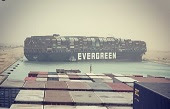It’s not clear what caused the collision between the US
warship and the Panamanian-flagged vessel Besiktas-M, but the spokesperson said
it did not result in any flooding on board the Truman and its nuclear
propulsion plants were unaffected.
No injuries were reported on either vessel, though the
merchant ship sustained some damage, a Navy official said.
An investigation is ongoing to determine how they collided,
but the official noted that the area they were in near the Suez Canal is
typically very densely packed with ships.
The Besiktas-M, a 617-foot (188-meter) long bulk carrier,
had exited the Suez Canal and was heading to Romania, according to tracking
website Marine Traffic.
The Truman, a 1,100-foot-long Nimitz-class aircraft carrier,
was heading toward the canal, tracking data indicates.
Marine expert Sal Mercogliano, a professor at Campbell
University, said in an X Spaces conversation that the area where the collision
occurred, near an anchorage off Egypt’s Port Said, had around 100 ships in it
at the time of the incident.
Former US Navy captain Carl Schuster, an instructor at
Hawaii Pacific University, said such conditions leave little room for error.
“There is not a lot of room for maneuvering in a restricted
seaway and both ships require about one nautical mile to stop,” Schuster said.
Small navigation mistakes, misreading of the other ship’s
intentions or delayed decision-making from the crew of either ship could have
put them in danger quickly “with very few viable options,” Schuster said.
Last
week the Truman was in Souda Bay, Greece, for a “working port visit” after two
months of combat operations in the Central Command region, a Navy statement
said. During that time, it conducted multiple strikes against Houthi rebels in
Yemen and launched airstrikes against ISIS in Somalia, the Navy said. The
Truman is one of 11 aircraft carriers in the US Navy fleet.
Accidents involving huge ships and commercial vessels are
rare as the carriers usually travel with a strike group, protected by a screen of
destroyers.
But ships entering the Suez Canal must travel in single
file, which could make them more vulnerable to a collision, experts said.
The
last known time a US carrier collided with a merchant vessel was on July 22,
2004, when a dhow, a sailing vessel common in the Middle East, struck the
former USS John F. Kennedy in the Persian Gulf, according to maritime outlet
USNI News.
Two US Navy destroyers were involved in fatal collisions in
2017. Seven sailors died after the USS Fitzgerald struck a cargo ship off Japan
in June that year, and 10 sailors were killed when the USS John S McCain
collided with a tanker off Singapore and Malaysia two months later.

















